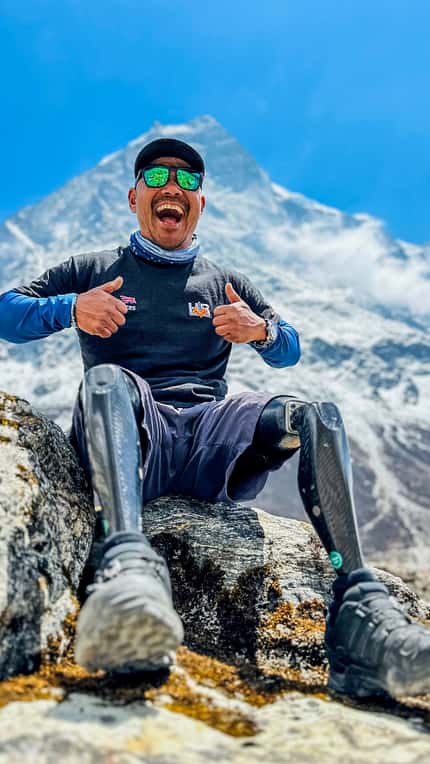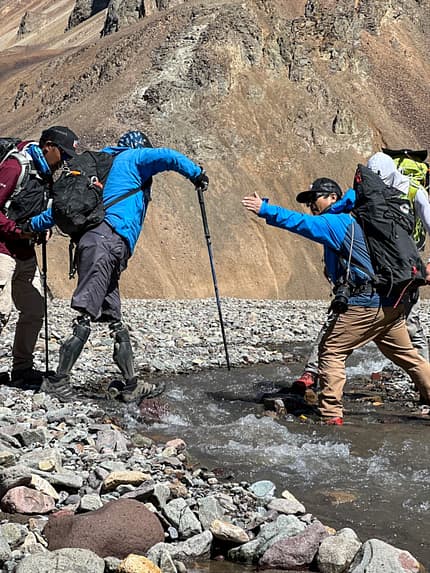A normal mountaineer: With artificial legs on Mount Everest

We—by which I mean the Royal Gurkha Rifles of the British Army—were on a foot patrol in the middle of Afghanistan when suddenly there was a bang. I stepped on a booby trap.
I couldn't even see my right leg anymore; my left leg was just dangling down there. I was very lucky that the bomb didn't fully explode, otherwise I would have died.

Hari Budha Magar.com
My team did an incredible job. They gave me the opportunity to live my life over again.
American special forces immediately flew me out by helicopter. They took me first to a field hospital at Camp Shorabak, then to Balad Air Base. I underwent three surgeries there, and two more in England.
First, I flew around the world for five days with serious injuries, then I spent almost a month in the hospital, then three and a half years in rehab. A long story of suffering.
It was a vicious cycle. Was I drinking because I was depressed? Or was I becoming depressed because I was drinking? At that time, only one thing was certain: I used alcohol to cope with my pain and my emotions. Even today, it's really hard for me to talk about it because, unfortunately, I wasn't a good father at the time. My only friend was whiskey.
I would be dead if I didn't have them. You have to understand: It wasn't just my life that was affected by the attack, but also that of my family. I couldn't do even the simplest things anymore. Playing soccer with my son? It was no longer possible. I can still remember one special day like it was yesterday. My son was three years old when I looked into his innocent face. At that moment, I knew I had to stop drinking.
My father always said, "If we're meant to die, we'll die. That can happen even if we fall down the stairs at home. But if we're not meant to die, we won't die." Seriously, if we're afraid all the time and everywhere, then we shouldn't even leave our house.
No, I am a passionate mountaineer and adventure fan.
Not really. I'm more of a sensible and responsible person. I don't do what I do just for fame, money, or glory. I do it because I think it's absolutely necessary to help other people, to inspire others.
I'm not ready to die, nor am I ready to abandon my family and friends. I'm at peace with myself. I may have had that terrible accident, but I've achieved far more in my life than I ever could have imagined. Now I'm here to raise awareness of disabilities. I hope that my successes on the highest mountains in the world will encourage other people to climb their own mountains, to pursue their own dreams. Whatever those may be for each person.
What limits us is our minds. Just think of the human revolution. We are the ones who have made impossible things possible. Before, we couldn't run fast enough. So what did we do? We designed things that allow us to move faster on land, at sea, and in the air. Now we're even able to travel to other planets. Who made that possible? Us humans! If we can run, we run. But if we can't run, we find ways around it, ways to get there.
The question is incorrectly formulated.
I ask you: How can people always be so negative? Seriously. I always ask that of the people I meet in this world. Almost all of us in this world have a choice about how we want to live our lives. We determine our lives, determine the goal we want to achieve. For example, I was born in a cowshed in Nepal, went to school barefoot, learned to write with chalk on a wooden board, was forced into marriage at the age of eleven, and grew up during a civil war. Always remember: Some people have no choice in their lives. I was one of them, but I made something of it anyway.
I go to the gym for two to three hours every day. My training consists of a mix of fitness, swimming, sauna, and ice baths. The bottom line: a lot of cardio, a lot of strength training, a lot of yoga, and a whole lot of meditation. That's all it is (laughs).
It depends on the mountain. There's a minimum of four people, a maximum of 26.
You have a completely wrong idea about my passion. No one lifts me up there, nor does anyone carry me.
I can answer that with a confident no.
The difference from others is that I can't walk as fast, and in some situations I might not be able to react as quickly. Otherwise, I'm a completely normal mountaineer.
If everything goes according to plan, by January 2026 at the latest. However, if I had more money at my disposal, I would finish sooner. But unfortunately, I don't have that much money.
Mount Everest. It was also really dangerous. You can use up so much oxygen up there, I really wouldn't have thought it. And if you run out of it, you die. That's just how it is. In the 2023 season, in which I climbed Mount Everest, a total of 17 people died. That still saddens me today. That's why my team and I are happy that we climbed Everest and reached the bottom safely. Of 478 mountaineers, only about 250 were successful. Recently, I stood on Aconcagua in the Argentinian Andes. Then there's Puncak Jaya—also known as the Carstensz Pyramid—in Oceania and Mount Vinson in Antarctica. And all of this with the support of the German orthopedic technology company Ottobock from Duderstadt. They have given tremendous support to my efforts, so that together we can help people realize their potential. They help me financially to realize my dreams, and I help them research and develop the best prostheses and orthoses in the world.
Hello? I'm a professional (laughs). Seriously, it only takes seconds. Imagine it's almost as fast as changing a tire in Formula 1.
Not when I go to bed (laughs).
I'm not a role model; I'm a guy without legs doing his best to raise awareness about disabilities. A disability may be our weakness, but that doesn't mean we can't do anything. There's no one in the world who's perfect. We all have our weaknesses. Not everyone with a physical disability climbs to the highest peaks. When your mission becomes bigger than yourself, you don't have to be afraid of what you want to achieve. Nothing can scare me. On the one hand.
Many of my friends say, "Hari, you're not crazy, you're totally crazy!"
I said, "Okay, guys, maybe a little crazy, but not stupid!" Because if I were stupid, I would kill myself and my teammates. And I'm not doing that.
Of course! You can't just forbid people from doing something just because they apparently can't do it or are different. That's exactly the stigma surrounding disability.
We first tried diplomatic means, but that didn't work. So we had no choice but to fight in the Supreme Court and win. I actually thought I'd be standing on Everest by 2019. Now it's taken almost six years. But it doesn't matter: We simply didn't give up; we just kept going until we won.
We only achieve amazing things if we try. If we don't try, we'll never know what's possible.

Hari Budha Magar.com
No, on the one hand. But on the other hand, yes. Because my successes have, of course, given me some self-confidence. Ultimately, it gave me the courage to climb Everest and prove that nothing in this world is impossible. This encourages me to simply inspire other people with disabilities every day so that they can finally do what they want to do.
outdoor-magazin





